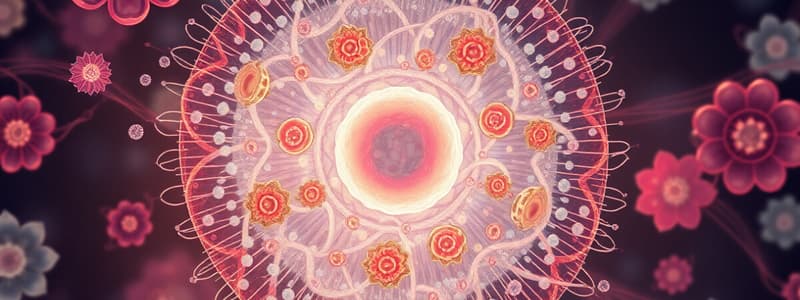Podcast
Questions and Answers
What is the primary function of the nucleus in a eukaryotic cell?
What is the primary function of the nucleus in a eukaryotic cell?
- Directs protein production and cellular processes (correct)
- Stores and modifies proteins
- Converts food energy into ATP
- Synthesizes lipids and carbohydrates
Which type of endoplasmic reticulum is involved in protein synthesis for secretion?
Which type of endoplasmic reticulum is involved in protein synthesis for secretion?
- Rough ER (correct)
- Cystic ER
- Smooth ER
- Peroxisomal ER
What role does the Golgi apparatus play in the cell?
What role does the Golgi apparatus play in the cell?
- Stores and modifies proteins into vesicles (correct)
- Regulates calcium levels in muscle cells
- Breaks down toxic substances
- Synthesize ribosomal RNA
Which organelle is primarily responsible for ATP production?
Which organelle is primarily responsible for ATP production?
The function of ribosomes in a cell is mainly to:
The function of ribosomes in a cell is mainly to:
What is a key characteristic of the rough endoplasmic reticulum?
What is a key characteristic of the rough endoplasmic reticulum?
Which of the following is NOT a function of the smooth endoplasmic reticulum?
Which of the following is NOT a function of the smooth endoplasmic reticulum?
The cytoplasm is primarily composed of:
The cytoplasm is primarily composed of:
What role do the nuclear envelope pores serve?
What role do the nuclear envelope pores serve?
Which statement is true about mitochondria?
Which statement is true about mitochondria?
Flashcards
Nucleus Function
Nucleus Function
Directs protein production and cellular processes.
Rough ER Function
Rough ER Function
Involved in protein synthesis for secretion.
Golgi Apparatus Role
Golgi Apparatus Role
Stores and modifies proteins into vesicles.
Mitochondria Function
Mitochondria Function
Signup and view all the flashcards
Ribosomes Function
Ribosomes Function
Signup and view all the flashcards
Rough ER Characteristic
Rough ER Characteristic
Signup and view all the flashcards
Smooth ER Exclusion
Smooth ER Exclusion
Signup and view all the flashcards
Cytoplasm Composition
Cytoplasm Composition
Signup and view all the flashcards
Nuclear Envelope Pores Role
Nuclear Envelope Pores Role
Signup and view all the flashcards
Mitochondria Statement
Mitochondria Statement
Signup and view all the flashcards
Study Notes
Eukaryotic Cells and their Organelles
- Eukaryotic cells are the structural unit of the body and contain a nucleus and other organelles with specific functions that work together to maintain the cell's shape and functionality.
Cytoplasm
- Cytoplasm is a viscous fluid that contains organelles, interconnected filaments and fibers (cytosol), and storage substances.
Nucleus
- The nucleus contains the genetic material (DNA), which directs protein production and cellular processes.
- The nucleus controls gene expression and initiates DNA replication.
- The nucleolus within the nucleus is where ribosomal RNA (rRNA) is made.
- The nuclear envelope has pores that allow materials to move in and out of the nucleus.
Mitochondria
- Mitochondria are the "powerhouse" of the cell.
- They convert the potential energy of food molecules into ATP through cellular respiration.
Endoplasmic Reticulum (ER)
- The ER is involved in the movement of substances within the cell.
- There are two types of ER: smooth and rough.
Smooth ER
- Performs functions such as lipid synthesis, carbohydrate metabolism, steroid synthesis in gland cells, regulation of calcium in muscle cells, and breakdown of toxic substances in liver cells.
Rough ER
- Covered with ribosomes, giving it a rough appearance.
- Provides a surface for ribosomes to synthesize secretory proteins (important for protein-secreting cells like endocrine glands).
- Involved in the synthesis of polypeptide/protein hormones.
Golgi Apparatus
- Stores, modifies, and packages proteins into vesicles.
- The vesicles transport proteins to their destination within or outside the cell.
Ribosomes
- Ribosomes are the sites of protein synthesis.
Studying That Suits You
Use AI to generate personalized quizzes and flashcards to suit your learning preferences.




